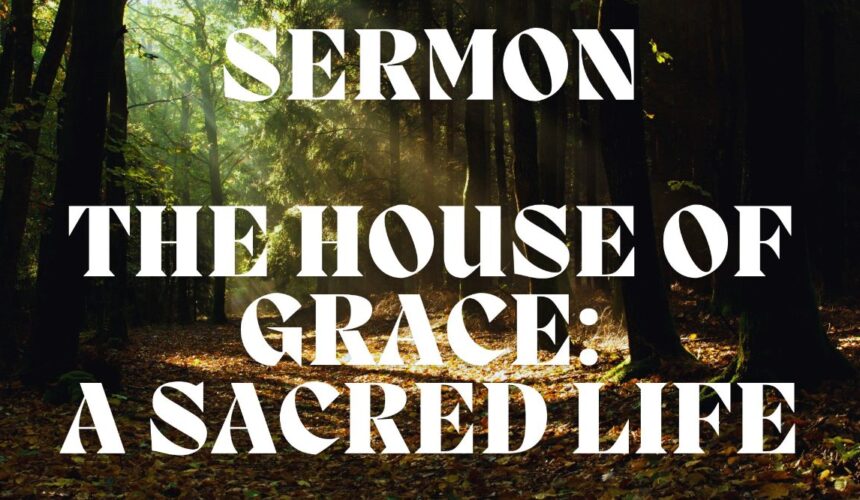The House of Grace: A Sacred Life
University Park United Methodist Church
15th Sunday in Ordinary Time
September 1, 2024
Scripture: 2 Corinthians 3:17 – 18
Imagine you’re outdoors, anywhere you feel good and at peace. Maybe you’re up in the mountains, surrounded by evergreens, walking alongside a little spring. Maybe you’re in the eastern part of the country, in a hardwood forest with lots of undergrowth and ancient rolling hills covered in trees that go for miles. Or maybe you’re a plains person, and you love the wind and the silence and the shortgrass prairie under the big sky.
You’ve heard there’s an old house around here somewhere. The rumors are vague; no one seems to know much about it. Some people say it’s a run down cabin built 150 years ago by a homesteader. Others say the rumors aren’t true at all. There is no house. It’s just one of those stories that always start out claiming to be fact but after investigation end up being something somebody heard one time. It doesn’t matter much: the day is beautiful, the sun is warm, the countryside is quiet and peaceful, you’re enjoying being there.
Eventually you find yourself on a path that’s a little wider and better traveled than the usual game trail. So you follow it along, curious, and suddenly without warning, you’re looking at a house you’ve never seen before. It seems solid and well built. The windows are clear and unbroken; the place is definitely not the old ruin you heard about. At first, you walk around it, look things over. Everything is quiet. After a few minutes, you get curious and go up on the porch. You call out, ask if anybody’s home. No one answers. You look in the front window, but you can’t see much. You knock a few times, but nobody comes to the door. Finally, not even knowing exactly why, you try the door handle, and the door opens. And tentatively, cautiously, you go inside.
Once you step through the door, you realize the place is a lot bigger than it looks from the outside. The house has multiple stories, nearly endless rooms to explore. You realize you could spend days, maybe weeks, in each room of the house just looking at what’s there and thinking about what you found. As the day passes, and you walk from room to room in this deceptively large house that seems to go on forever, you begin to meet other people who are also exploring the house. You talk about what you’ve found; you point each other to especially intriguing rooms or objects or art on the wall. And as the sun slips further down toward the horizon, you realize learning about this house is going to take a long time. There’s so much here; no matter how much you find there’s always more to discover. You’re going to have to come back. You might even bring friends – people who could appreciate what you’ve found. You leave to get home before dark, but somehow you know that in some way you’re not actually going anywhere. Now that you know this house is here, and you have some sense for the beauty and mystery inside, you’ll be back. And at least part of your heart will always be there.
Houses are an old and evocative symbol. For thousands of years, they’ve show up in dreams, in myths and legends, in fiction – sometimes as metaphor for ourselves, sometimes marking the division between public and private, or personal and communal. John Wesley, one of the primary founders of Methodism, used the metaphor of a house for the life of faith. That’s part of the reason I’ve been calling this sermon series “the house of grace,” because I believe grace is at the heart of Christian faith. When I asked you to imagine finding the house and exploring it, I was giving you a kind of expanded version of Wesley’s idea of the house of faith.
Grace is often thought of as God’s unmerited love or favor. But I think maybe it’s more accurate, or at least as accurate as our language about God can get, to say that grace is the character of God. God loves: with complete abandon, with no thought of holding back, no thought of who’s worthy of being loved or who’s not, who deserves love or who doesn’t. Grace is what the book of First John is talking about when it says, “God is love.” Grace is what Jesus is talking about when he says that God makes the sun shine on the evil and on the good. God sends rain onto the crops of the just and the unjust alike. God gives these gifts to everybody, because that’s just who God is. It’s one of the things that makes grace so hard to understand: even though grace is the bedrock of our existence, even though our entire lives are a gift from God that we never asked for and can’t possibly earn, we still tend to think grace is not real because we’ve built whole societies around the idea that everyone should get what they deserve, that we all have to earn our place. But that’s not how God sees it. Infinite worth and delight, a place at the table, full acceptance for who we are – we don’t earn those things those things. God gives them to us, because that’s just who God is.
For Wesley and other theologians, grace works differently depending on where we are in our lives. Prevenient grace is the grace present to us even before we’ve ever seen the house. Prevenient grace leads us to find the house, go up on the porch, look around. Justifying grace is the grace that leads us to try the door and go inside. In some ways, justification is the realization of who we really are: because who we really are is who we are in God’s eyes. Justification is that moment or that process when we invite God to work through us for God’s purposes. Justifying grace is at work when we embrace a Christian way of life. And a third type of grace, that Wesley called sanctifying grace, is the grace that slowly, patiently, lovingly changes us as we spend time exploring the house of Christian faith.
So today, I want to say a little bit about that third way grace works in our lives. As we spend time exploring Christian life, we find ourselves being changed, often so slowly and subtly we don’t even notice, until one day we realize we are different people than we were. And throughout our lives God’s sanctifying grace continues that slow, patient process of shaping us. We become more awake to the constant presence of God, to the holiness of our lives, and we become more Christlike in the process.
There’s a wonderful writer on Christian spiritual life named Maggie Ross. In one of her books, called Writing the Icon of the Heart, Ross calls Jesus “the undistracted one.” Jesus is the one whose full attention is always on God, regardless of what he’s doing or what’s going on around him. I think that’s another way to talk about sanctification: it’s the process by which God helps us become less distracted, more focused on God, more like Christ.
I think that process of change is what the Apostle Paul was writing about in his second letter to the Corinthian church. Paul doesn’t use the symbol of a house. Instead, he talks about “seeing the glory of the Lord as though reflected in a mirror.” For Paul, we don’t see God’s glory directly. We see it reflected – in Jesus, in each other, in God’s creation, in acts of wisdom and kindness and courage taking place around us. As we learn to recognize that reflected glory, to notice it, we begin to see it everywhere. We begin to realize that God’s glory and grace are always present to us. And over time, we are changed – as Paul puts it, from one degree of glory to another. Gradually, we become more like Christ. Others begin to see the image of God reflected in us.
So part of what we’re doing as Christians – a big part of what we’re doing – is inviting God to lead us from one degree of glory to another. One way we do that is to use what has traditionally been called “the means of grace.” So for example we worship, because worship is a means of grace. It’s a way of inviting God to make the image of God in us more visible. Taking communion, as we do today, that’s a means of grace. Prayer, scripture reading, acts of service to others: all of these things are part of Christian life because they are conscious invitations to God to lead us from one degree of glory to the next. They’re ways that God helps us to grow spiritually, to become more like Christ.
I’ve been closing these sermons by posing questions to think about. I don’t need to know the answers, although if you’d like to share with me I’d love to hear them. So here are a few questions about sanctifying grace.
- What leads you to explore the house of faith? What people or events in your life brought you here? What keeps you in the house of faith?
- How do you see God’s glory reflected in your inner life, or the lives of others, or the world around you?
- How have you changed over the years? How is your prayer, or your understanding of God, or your understanding of yourself, different than it used to be? Do you think that God’s grace had some role in that change?
Let’s take a few moments for reflection.


